 EDITOR'S PICK
EDITOR'S PICK
Driver Grateful For Her Tesla Electric Car in Flood Waters, But It's Not a Boat
08 Aug 2025 | Synopsis
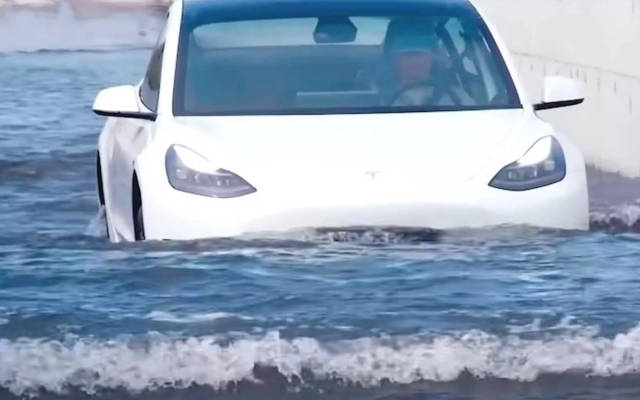 While a young Tesla driver in Florida safely navigated floodwaters, praising its sealed battery and electronics, such flooding should be avoided despite added protection. Such designs make EVs more water-resistant than gas cars, lacking air intakes and exhausts, but deep water poses risks - corrosion, mold, or electrical damage if seals fail, creating short-circuits and potential battery fire.
While a young Tesla driver in Florida safely navigated floodwaters, praising its sealed battery and electronics, such flooding should be avoided despite added protection. Such designs make EVs more water-resistant than gas cars, lacking air intakes and exhausts, but deep water poses risks - corrosion, mold, or electrical damage if seals fail, creating short-circuits and potential battery fire.GM Pushes Chevy Silverado EV To An Astonishing 1,000+ Mile Range on a Single Charge
07 Aug 2025 | Synopsis
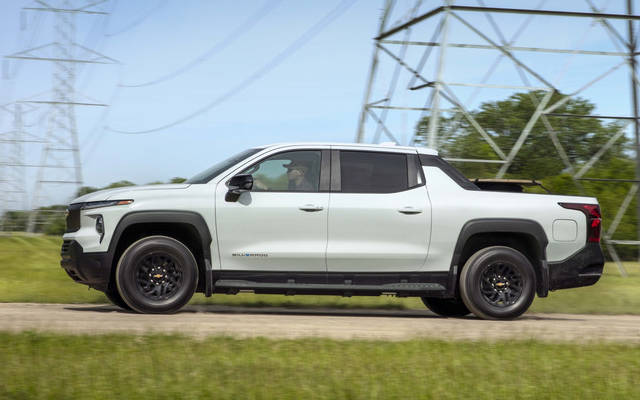 The Chevrolet Silverado EV has achieved a record-breaking 1,059 miles on a single charge, more than doubling its EPA rating. GM engineers accomplished this by utilizing efficient driving techniques and minimizing energy consumption, including maintaining 20-25 mph speeds and using a battery-powered fan for cooling. The achievement demonstrates the Silverado EV's potential range in optimal conditions, contributing to advancements in electric vehicle technology."
The Chevrolet Silverado EV has achieved a record-breaking 1,059 miles on a single charge, more than doubling its EPA rating. GM engineers accomplished this by utilizing efficient driving techniques and minimizing energy consumption, including maintaining 20-25 mph speeds and using a battery-powered fan for cooling. The achievement demonstrates the Silverado EV's potential range in optimal conditions, contributing to advancements in electric vehicle technology."Tesla Cybertruck Wanted By U.S. Air Force As Targets In Munitions Training
07 Aug 2025 | Synopsis
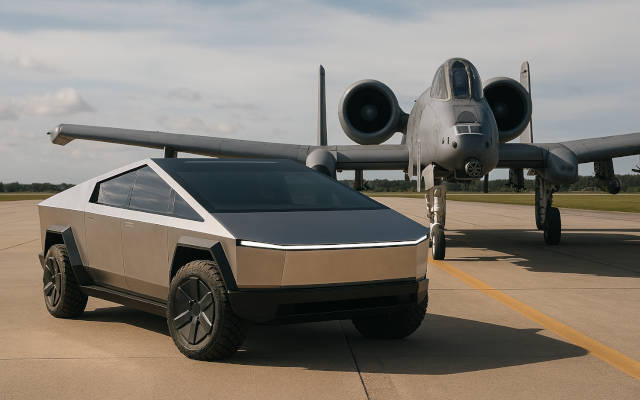 The US Air Force seeks to purchase two Tesla Cybertrucks for use as targets in precision munitions testing and training. Citing potential use by adversaries, the Air Force aims to prepare for real-world scenarios involving durable vehicles like the Cybertruck. The trucks will be transported to the White Sands Missile Range in New Mexico, contributing to the Special Operations Command's Stand Off Precision Guided Munitions program.
The US Air Force seeks to purchase two Tesla Cybertrucks for use as targets in precision munitions testing and training. Citing potential use by adversaries, the Air Force aims to prepare for real-world scenarios involving durable vehicles like the Cybertruck. The trucks will be transported to the White Sands Missile Range in New Mexico, contributing to the Special Operations Command's Stand Off Precision Guided Munitions program.Elon Says Teslas Drive Themselves. The Crash Data Tesla Tried To Hide From A Court Says Otherwise
07 Aug 2025 | Synopsis
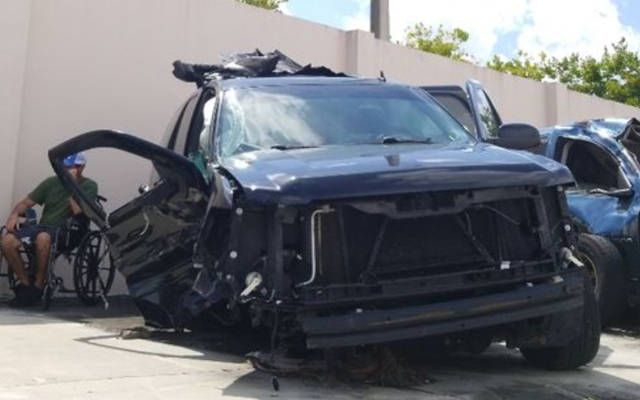 A jury found Tesla partially liable in a fatal crash involving Autopilot and awarded $243 million in damages. Evidence showed Tesla withheld critical crash data and misled investigators. Despite knowing the system had limitations, Elon Musk claimed Teslas "can drive themselves." TechDirt highlights this as a dangerous disconnect between Tesla's marketing and reality, raising serious concerns about transparency, safety, and accountability in autonomous vehicle development."
A jury found Tesla partially liable in a fatal crash involving Autopilot and awarded $243 million in damages. Evidence showed Tesla withheld critical crash data and misled investigators. Despite knowing the system had limitations, Elon Musk claimed Teslas "can drive themselves." TechDirt highlights this as a dangerous disconnect between Tesla's marketing and reality, raising serious concerns about transparency, safety, and accountability in autonomous vehicle development."China's Cheap EV Dominance Is On The Verge Of Imploding
07 Aug 2025 | Synopsis
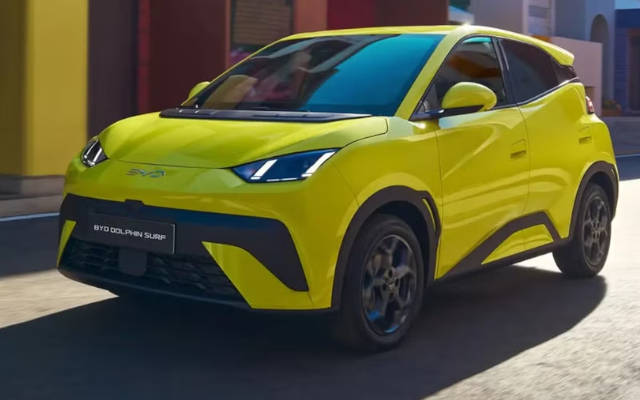 China's dominance in cheap EVs is built on a fragile foundation. An unsustainable price war among 100+ brands, fueled by now-expiring government subsidies, has made most automakers unprofitable. Experts predict a market "implosion," leading to mass bankruptcies and consolidation. While consumers currently benefit from low prices, a massive industry shakeout is expected, leaving only a few strong players standing.
China's dominance in cheap EVs is built on a fragile foundation. An unsustainable price war among 100+ brands, fueled by now-expiring government subsidies, has made most automakers unprofitable. Experts predict a market "implosion," leading to mass bankruptcies and consolidation. While consumers currently benefit from low prices, a massive industry shakeout is expected, leaving only a few strong players standing.
 Si Exclusive
Si Exclusive
Hydrogen's Flight Path: Fuel Cells, Turbines, and the Economics of Clean Aviation
10 Oct 2025 |  Aviation is shifting from Jet A to four fuel systems: electricity, hydrogen (fuel cell and combustion), SAF, and petroleum. Fuel cells suit short-haul aircraft; hydrogen combustion may power long-range jets. SAF bridges legacy fleets. Hydrogen costs - $5-$7/kg today, possibly $2/kg by 2040 - impact ticket prices and infrastructure decisions. Airport authorities, airlines, and governments will share deployment costs. Each fuel has distinct environmental pros and cons shaping aviation's net-zero future.
Aviation is shifting from Jet A to four fuel systems: electricity, hydrogen (fuel cell and combustion), SAF, and petroleum. Fuel cells suit short-haul aircraft; hydrogen combustion may power long-range jets. SAF bridges legacy fleets. Hydrogen costs - $5-$7/kg today, possibly $2/kg by 2040 - impact ticket prices and infrastructure decisions. Airport authorities, airlines, and governments will share deployment costs. Each fuel has distinct environmental pros and cons shaping aviation's net-zero future.
 11 Oct 2025 00:42:52 UTC |
RECENT PODCASTS
BYD Soars - Cheaper Tesla Models - The Bolt is Back - Rivian
SEARCH RSSTREAM
 53 New Postings In Past 24 Hours
53 New Postings In Past 24 Hours
Category:finance
Region:NoAmerica
Date:10 Oct 2025
Category:policy
Region:NoAmerica
Date:10 Oct 2025
Category:mobility
Region:AsiaPacific
Date:10 Oct 2025
Category:mobility
Region:AsiaPacific
Date:10 Oct 2025
Category:finance
Region:NoAmerica
Date:10 Oct 2025
Category:finance
Region:IndoAsia
Date:10 Oct 2025
Category:energy
Region:Global
Date:10 Oct 2025
Category:energy
Region:NoAmerica
Date:10 Oct 2025
Category:finance
Region:NoAmerica
Date:10 Oct 2025
Category:finance
Region:Global
Date:10 Oct 2025